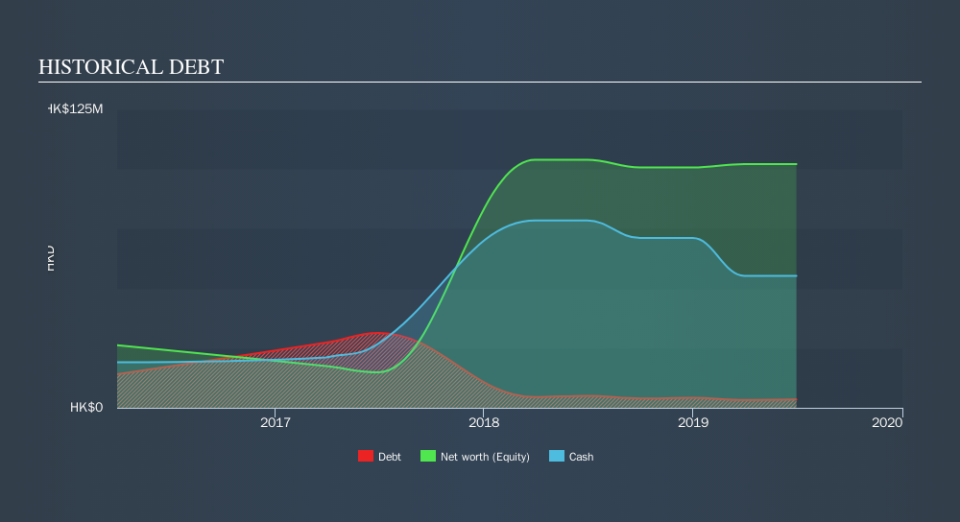Taste Gourmet Group (HKG:8371) Seems To Use Debt Rather Sparingly

Legendary fund manager Li Lu (who Charlie Munger backed) once said, 'The biggest investment risk is not the volatility of prices, but whether you will suffer a permanent loss of capital. When we think about how risky a company is, we always like to look at its use of debt, since debt overload can lead to ruin. We note that Taste Gourmet Group Limited (HKG:8371) does have debt on its balance sheet. But is this debt a concern to shareholders?
Why Does Debt Bring Risk?
Generally speaking, debt only becomes a real problem when a company can't easily pay it off, either by raising capital or with its own cash flow. In the worst case scenario, a company can go bankrupt if it cannot pay its creditors. However, a more common (but still painful) scenario is that it has to raise new equity capital at a low price, thus permanently diluting shareholders. Having said that, the most common situation is where a company manages its debt reasonably well - and to its own advantage. When we think about a company's use of debt, we first look at cash and debt together.
Check out our latest analysis for Taste Gourmet Group
What Is Taste Gourmet Group's Debt?
The image below, which you can click on for greater detail, shows that Taste Gourmet Group had debt of HK$3.27m at the end of March 2019, a reduction from HK$5.06m over a year. But it also has HK$55.3m in cash to offset that, meaning it has HK$52.0m net cash.
A Look At Taste Gourmet Group's Liabilities
Zooming in on the latest balance sheet data, we can see that Taste Gourmet Group had liabilities of HK$25.7m due within 12 months and liabilities of HK$5.21m due beyond that. Offsetting these obligations, it had cash of HK$55.3m as well as receivables valued at HK$4.34m due within 12 months. So it can boast HK$28.7m more liquid assets than total liabilities.
This short term liquidity is a sign that Taste Gourmet Group could probably pay off its debt with ease, as its balance sheet is far from stretched. Simply put, the fact that Taste Gourmet Group has more cash than debt is arguably a good indication that it can manage its debt safely.
Better yet, Taste Gourmet Group grew its EBIT by 102% last year, which is an impressive improvement. If maintained that growth will make the debt even more manageable in the years ahead. The balance sheet is clearly the area to focus on when you are analysing debt. But you can't view debt in total isolation; since Taste Gourmet Group will need earnings to service that debt. So when considering debt, it's definitely worth looking at the earnings trend. Click here for an interactive snapshot.
Finally, a business needs free cash flow to pay off debt; accounting profits just don't cut it. Taste Gourmet Group may have net cash on the balance sheet, but it is still interesting to look at how well the business converts its earnings before interest and tax (EBIT) to free cash flow, because that will influence both its need for, and its capacity to manage debt. Looking at the most recent three years, Taste Gourmet Group recorded free cash flow of 34% of its EBIT, which is weaker than we'd expect. That's not great, when it comes to paying down debt.
Summing up
While it is always sensible to investigate a company's debt, in this case Taste Gourmet Group has HK$52.0m in net cash and a decent-looking balance sheet. And it impressed us with its EBIT growth of 102% over the last year. So is Taste Gourmet Group's debt a risk? It doesn't seem so to us. Another positive for shareholders is that it pays dividends. So if you like receiving those dividend payments, check Taste Gourmet Group's dividend history, without delay!
At the end of the day, it's often better to focus on companies that are free from net debt. You can access our special list of such companies (all with a track record of profit growth). It's free.
We aim to bring you long-term focused research analysis driven by fundamental data. Note that our analysis may not factor in the latest price-sensitive company announcements or qualitative material.
If you spot an error that warrants correction, please contact the editor at editorial-team@simplywallst.com. This article by Simply Wall St is general in nature. It does not constitute a recommendation to buy or sell any stock, and does not take account of your objectives, or your financial situation. Simply Wall St has no position in the stocks mentioned. Thank you for reading.

